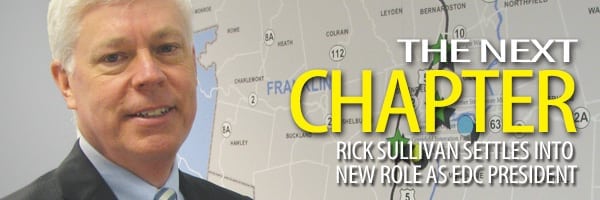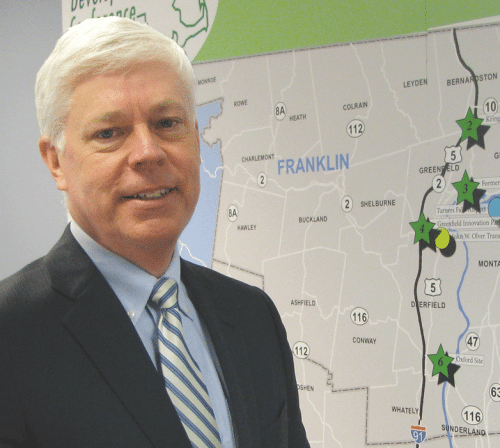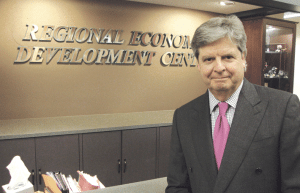
The Next Chapter
Rick Sullivan Settles into New Role as EDC President
 Having been a mayor, Richard Sullivan Jr. understands how city leaders think. But he wants them to broaden their horizons.
Having been a mayor, Richard Sullivan Jr. understands how city leaders think. But he wants them to broaden their horizons.
“Cities often don’t focus on the importance of regional development,” said Sullivan, the new president of the Western Mass. Economic Development Council (EDC). “I understand the parochialness; every community wants development they think is appropriate for their community first.
“But there also needs to be a realization,” he continued, “that all the cities and towns of the region need to be strong and growing — that it’s good for neighboring communities when jobs are created in Holyoke, Chicopee, Northampton, or Greenfield, because people from surrounding communities are going to work at those companies and do business with those companies.”
The EDC, which Allan Blair led from its inception 19 years ago until his retirement last fall, has strived for decades to create region-wide vitality, but in some ways, the challenge is greater now, Sullivan said.
“We would rather have growth opportunities happening in neighboring communities than in other parts of the country,” he told BusinessWest. “We live in a time when businesses, for the most part, don’t have to be in any one city or town; they can be really flexible. So we need to really sell the attributes we have as a region.”
To do that, he continued, “we’ve got to change the way we look at ourselves in Western Massachusetts. “There are so many great attributes of the region, so we need to be confident that this is, in fact, a good place to work, to do business, to live. We understand we have needs, but we’re coming from a good place, and we need to tell that story.
“It’s easy to fall into the trap of thinking that good things only happen here when the economy is strong and something spills over from Boston,” Sullivan added. “But I think it’s time Western Massachusetts took the lead and became aggressive in telling our story. It’s a great story; so many good things are happening here. We need to go out, get to the table, and get our share of wins.”
State of Affairs
Sullivan has traveled a wide and varied road to his latest assignment. After serving as Westfield’s mayor from 1994 to 2007, he headed up the state Department of Conservation and Recreation before Gov. Deval Patrick brought him into his cabinet in 2011 as secretary of Energy and Environmental Affairs, a role in which he oversaw six environmental, natural-resource, and energy-regulatory agencies.
From there, Patrick tapped him to be his chief of staff, where he remained through the ex-governor’s second term last year.
“Having spent the last seven and a half years in Boston, I’ve been able to make some contacts there. And I learned that Western Mass. really needs to get a seat at the table when there are growth opportunities; we need to be able to tell the story of Western Mass.,” he said, using as one example the region’s wealth of talent in precision manufacturing.
“You’re seeing growth in the economy of Eastern Mass. as companies ramp up and take new technologies to scale and begin manufacturing. Here in Western Mass., that’s one of our strengths — we can do those manufacturing processes. We can be competitive with other parts of the country; they don’t need to go to some southern state. We need to be at the table on this.”

Allan Blair, who led the EDC from its inception in 1996 until his retirement last year, forged a number of key partnerships among education and workforce-development entities.
Sullivan often brings up the concept of “telling our story,” something he did for years serving in Patrick’s administration.
“I did feel an obligation every day, as member of the cabinet, to bring the Western Mass. story to the table,” he said. “Certainly, it was really easy with Gov. Patrick, because he was very cognizant of the whole state, every single day. He has a home in Richmond, and he has a special place in his heart for Western Mass.”
But telling the story in Boston and spearheading a number of initiatives creating positive change are two different challenges, he went on. “Western Mass. has taken a regional approach for a long time, perhaps out of necessity because we’re smaller than most regions, and we need to band together. The EDC is a place where all voices can be convened. We are well-positioned to be that strong voice.”
The job was an attractive one, he said, opening up as Patrick neared the end of his last term as governor. “I’ve got a long history with the EDC, dating back to my time as mayor of Westfield and working on a project there.”
Actually, he quickly added, he was still City Council president when the EDC and the Westmass Area Development Corp. brought forward plans for Summit Lock Industrial Park, which eventually attracted CNS Wholesale Grocers as its largest tenant. “That was certainly a real turning point in the organization and the region, and allowed Westmass Development to move forward.”
Three Buckets
The EDC’s role in the regional economy is a broad one, boasting affiliations with local chambers of commerce and business improvement districts, Westmass, the Greater Springfield Convention and Visitors Bureau (GSCVB), Westover Metropolitan Airport, and Valley Venture Mentors. But Sullivan said its key focus can be narrowed to three “buckets”: precision manufacturing, higher education, and entrepreneurship, or the innovation economy.
“Precision manufacturing is really the invisible backbone of the economy of Western Mass.,” he explained. “There are a couple of large manufacturers, but there’s a whole network of smaller advanced manufacturers that call Western Mass. home — and have for generations.”
If the industry is a regional calling card, Sullivan said, it’s one the EDC and its partners need to talk up, since these are businesses that don’t typically focus on bringing attention to themselves.
“We need to help them by taking the conversation out there,” he said. “The individuals running these businesses, frankly, don’t have time to be the voice touting this industry, the importance of this network in Western Mass. That’s part of what we need to do as the EDC.”
The industry’s biggest issues revolve around talent and skill sets — not just to fill the jobs available today, but the wave of openings on the horizon over the next decade.
“The workforce on the floor right now is older, and a lot of jobs will come open in the next five to 10 years,” Sullivan said. “So we’re working with the technical schools, the community colleges, and other universities here in Western Mass., working with the Regional Employment Board, to develop really specific education and training.”
A good example is CNR Changchun Railway Vehicles, the Chinese company planning to launch manufacturing operations in Springfield — a project expected to generate more than 100 construction jobs but, more important, up to 250 permanent jobs in the plant. But those positions will require specific skills and certification, as do many manufacturing jobs.
“Manufacturing jobs today are clean, high-tech, IT-driven jobs, and they’re jobs that provide enough income for you to have good quality of life, a good middle-class living,” Sullivan said. “We want to make connections with the rail-car company and other manufacturers in the region and grow the industry here.”
The second bucket, and one that’s related to the first, is the higher-education system in Western Mass. “It’s strong in Western Massachusetts, which is important for an educated workforce,” Sullivan said. “It’s an important business sector here, and we need to tell the story of our schools of higher education here.”
The reason, of course, is to build the skilled workforce that will not only stay in Western Mass., but will develop their own enterprises and scale them up.
“I met with the college presidents,” he said. “They’re willing to step up and play those roles. That’s exciting.”
The third bucket is intertwined with the second, and that’s the region’s innovation economy, built largely through entrepreneurship. “You can see tangible growth in the sector. You see emerging technologies and clusters like Amherst or the Holyoke Innovation District or here in Springfield, with Valley Venture Mentors and commitments from companies like MassMutual and the Davis Foundation, to name just two.”
Innovation crosses all industries, Sullivan continued. “It can be IT-related or biotech-related. There are some great opportunities when you look at issues like clean energy and water technology and innovation.”
From his years dealing with environmental issues on the state level, Sullivan is well aware of the importance of the burgeoning green industries in Western Mass. and projects like a federally funded drinking-water-innovation center at UMass Amherst, tasked with finding solutions for cleaning up the world’s water supply.
“You can go down to the Cape and look at nitrate contamination, but clean water is a global issue,” he said. “And there’s no reason why it can’t be centered here in our region. If we can capture that market, it plays into the good work we have started with innovation and entrepreneurship.
“I think it’s a really exciting time for the region as a whole,” he went on, “and the EDC has a great opportunity to really set the agenda for the region around business growth and business development.”
Games and Gaming
Other EDC-affiliated organizations, like the GSCVB, have their own priorities. “I want to be supportive, plug in where I can be helpful,” Sullivan said. “Mary Kay [Wydra, GSCVB president] is clearly the professional there. The perfect example of that is work on Boston’s Olympic bid and where Western Massachusetts can plug into that. The EDC can be the larger regional voice, but they obviously have the experience to do the nitty-gritty work.”
While Boston’s bid is far from a sure thing, another recreational draw, MGM Springfield, is definitely on its way, breaking ground this spring on an $800 million casino complex in Springfield’s South End. That poses more opportunities — and challenges — for the EDC.
“Obviously, we’ve got construction that’s going to take place,” Sullivan said. “I’ve had conversations with [MGM Springfield President] Mike Mathis, who has been a good partner, trying to plug into our local construction companies and subs, helping to train up the workers. We want our companies, our workers, on these construction projects. That’s the promise they’ve made, and they’ve been very good about keeping that promise.”
Long-term, because MGM is talking about 3,000 permanent jobs in the completed casino, “it goes back to workforce training and narrowing skills gaps,” he continued. “Some jobs will require a high-school or community-college degree, while some higher-level jobs will require more. As a region, we need to be able to do the training for long-term jobs in casino operations.”
The EDC also wants to facilitate connections between the casino and a host of potential locally based vendors, he noted. “We’d like local florists to provide services, or local linen companies, cleaning companies — all the functions that occur on a daily basis in casino operations. We need to make these connections here in Western Massachusetts. I think the EDC can play a role, both with the casino and the rail company — these long-term, large-impact projects — in making sure our local vendors get these jobs.”
Some of those vendors might not have the size to take on that work, he added, which is why the EDC wants to cultivate programs to help them grow. As for the rail-car operations, workers will need to be trained and certified to tackle that manufacturing niche.
“That process just doesn’t happen overnight,” Sullivan said, referring to both the casino and Changchun. “The time is now to make those impacts. Years from now, when things are under construction, that’s be a little late in the game. It seems early, but it’s really not, with the lead time involved with many of those functions.”
Moment in Time
If all that seems like a lot for the EDC to have on its plate during a crucial time in Greater Springfield’s history, well, Sullivan doesn’t deny that. But he’s encouraged by the fact that many different organizations have already made the connections to support the programs needed for further economic growth.
In addition, he’s gratified by the reception he’s received from area mayors, chambers of commerce, and other economic leaders in taking on his new role.
“Everyone has been very welcoming, and there’s a real sense of excitement — not about me personally, but excitement about the potential of the region and what can happen here,” he told BusinessWest. “So, I think this is a moment in time that, if we seize it, can have some long-term economic impact in Western Massachusetts. I have to say, I’m extremely excited about the potential.”
Joseph Bednar can be reached at [email protected]





